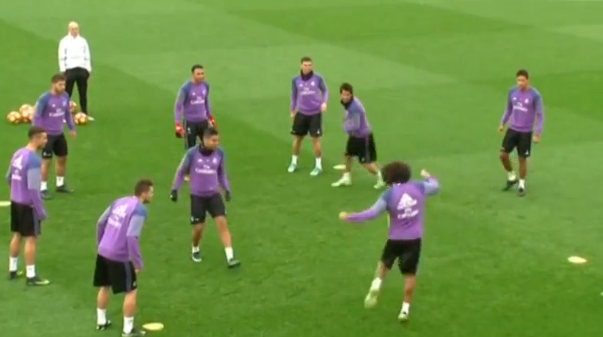
LONDON, England (Reuters) — Scientists have found signs of brain damage that could cause dementia in a handful of former soccer players, fueling worries about the danger of frequent knocks from heading the ball or colliding with others on the field.
The small study was the first of its kind, involving post mortems on six men who died with dementia after long careers playing soccer. All were skilled headers of the ball.
The study, published in the journal Acta Neuropathologica on Wednesday (February 15), followed 14 retired soccer players with dementia and secured next-of-kin permission for post mortem examinations for six of them.
The scientists found evidence of chronic traumatic encephalopathy (CTE), a potential cause of dementia, in four of the six brains. All six also had signs of Alzheimer’s disease.
“In your brain you’ve got grey matter which is basically the neurones and the white matter which is the wires between the neurones and some of the white matter is torn. That’s very distinctive for CTE, yeah it’s very distinctive. The other type of pathology is around the blood vessels. Going throughout your brain you’ve got lots of tiny blood vessels and there’s tearing around the blood vessels. Your brain is like blancmange in consistency but your blood vessels are just a little bit tougher and so if you do a rapid rotation they act like little cheese wires and do bits of damage around them and cut the nerve fibres and that type of damage is also distinctive for CTE,” said Professor John Hardy of University College London, a co-author of the study.
The results suggest some professional soccer players might risk the same long-term cognitive problems suffered by boxers and some American football players.
CTE is common in ex-boxers and has been linked to progressive memory, behavioural and motor impairment.
“The idea of boxing is to cause concussion. Footballers definitely try and avoid concussion so it’s a very different situation. Of course we’re putting the blame on heading in this interview but actually occasionally footballers do get concussed because of banging of heads and we can’t actually say it’s heading that is the problem it could in fact be the occasional concussions that footballers get,” Hardy said.
Hardy said the research does not prove a positive link between heading a football and developing dementia, but said there is a complicated relationship between the two.
“So I think it’s bit dangerous to actually separate them completely because there are commonalities between them and certainly they are additive pathology. So if you’ve got a little bit of brain damage to do with an Alzheimer’s change and a little bit of brain damage to do with CTE you are more likely to be demented,” he said.
The risks are also thought to be minimal for occasional players.
“I want to emphasise though that the people we’ve studied, these are people who were professional footballers, who played football probably every day of their lives for 25 to 30 years, probably many hours a day. This is very different from casual, weekend player or a school player. It’s just a different order of magnitude of contact,” Hardy said.
Soccer is the most popular sport in the world and scientists said the danger of head injuries had to be weighed against the game’s known benefits in improving cardiovascular health, which actually reduces the likelihood of developing dementia.
Unlike boxing or American football, blows to the head in soccer are generally lower impact and players are less likely to experience concussion. But there may still be cumulative damage from sub-concussive impacts, experts believe.
Britain’s Football Association said more work was needed into whether degenerative brain disease was more common in ex-footballers, adding it planned to jointly fund research with the Professional Footballers’ Association.







